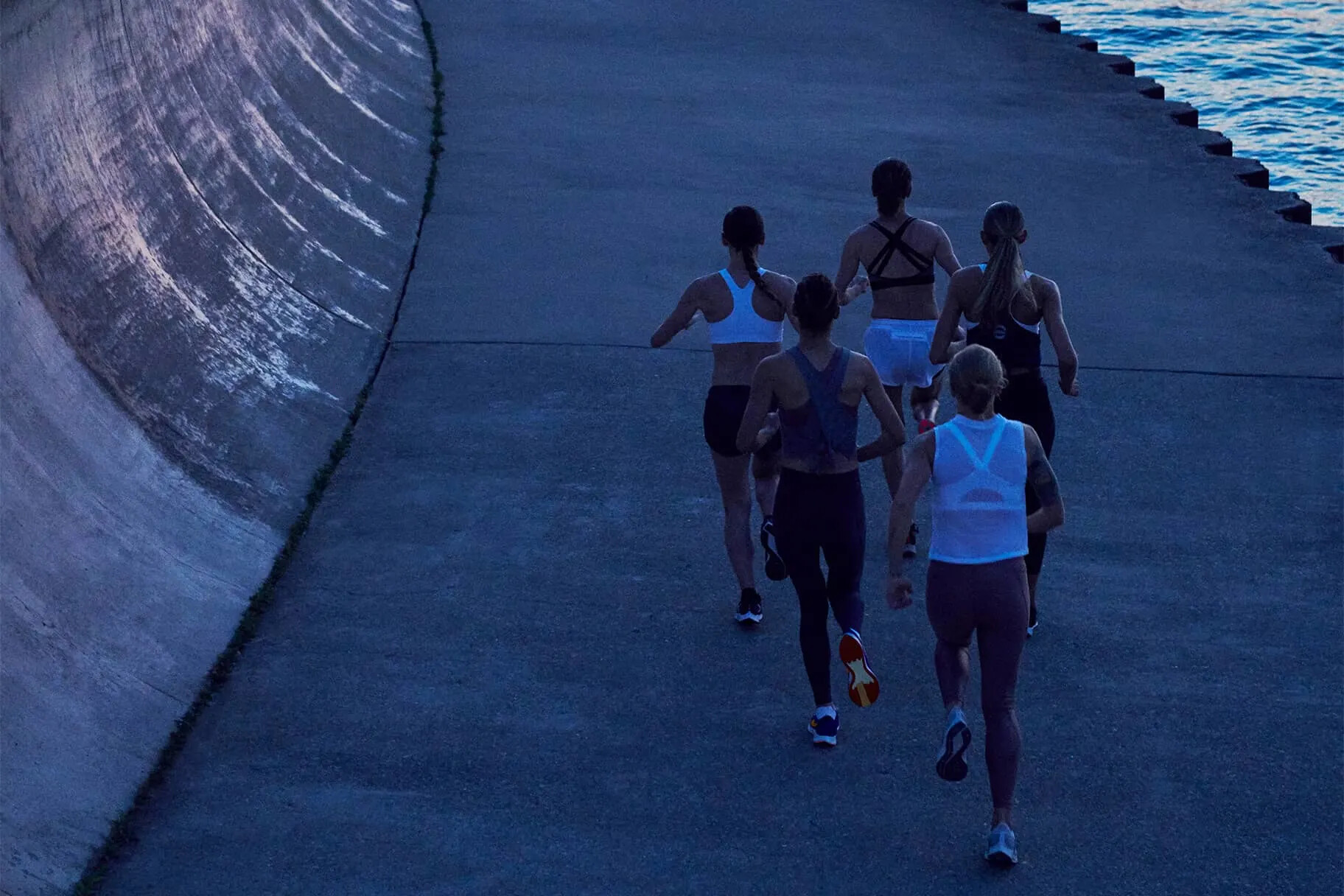Running News Daily
Running News Daily is edited by Bob Anderson. Send your news items to bob@mybestruns.com Advertising opportunities available. Train the Kenyan Way at KATA Kenya and Portugal owned and operated by Bob Anderson. Be sure to catch our movie A Long Run the movie KATA Running Camps and KATA Potato Farms - 31 now open in Kenya! https://kata.ke/
Index to Daily Posts · Sign Up For Updates · Run The World Feed
Ten Tips for Running in the Morning
There are so many great reasons to run in the morning. It's a great way to wake up and watch the world awaken with you. It not only gives you a big energy boost, it makes you feel as if you've accomplished something even before the day is started. You may even find that a morning run fits better into your daily schedule, especially if training for a race.
This is not to suggest that getting into the habit is easy, especially if you're not a morning person. But there are ways to ease you into the routine and in ways you may even enjoy.
Running in the Morning
If your goal is to run in the morning, you might first want to ensure you have good sleep habits. Otherwise, you may be too tired to follow through. Another way to ensure you run in the morning is to sleep in your running outfit or lay out your clothes and shoes ahead of time. You also can try putting your alarm clock out of reach, incentivizing yourself, changing your route, and getting a running buddy. Eating and hydrating well as well as wearing appropriate clothing—including reflective clothing when it is dark—can help promote a good morning run experience.

Below you will find more on these tips. Learn how and why you may want to incorporate these ideas.
1.- Teach Yourself Good Sleep Habits
Building a morning running habit starts with a good night's sleep. This may be difficult if you're used to late-night TV or use TV to lull you to sleep.
To start the journey, practice good sleep hygiene. This is the term used to describe practices that better ensure healthy sleep patterns. According to the American Sleep Association, you can train yourself to sleep at an earlier hour if you:

Avoid caffeine or alcohol three hours before bedtime.
Don't take midday naps.
Get into a nightly routine to help you unwind, such as a warm bath, meditation, or listening to calming music.
Plan to go to sleep at the same time every night.
Set up a quiet and comfortable bedroom.
Stop watching TV, reading, or electronic devices an hour before bedtime.
As unnatural as this may seem at first, practice will eventually make perfect if you just keep with it.
2.- Sleep in Your Running Clothes
It's hard to blow off a run when you're already dressed for it. If you really want to get a jump start and find motivation as soon as you open your eyes, simply wear your running clothes to bed.
As odd as this may seem, it is a trick that many morning runners use. While you will probably not want to wear yesterday's sweat-stained clothes to bed, it may actually feel nice putting on a freshly laundered running gear. Just leave your shoes next to the bed, and you're ready to go.
3.- Lay Out Your Clothes
If you don't like the idea of sleeping in your running clothes, you can lay them out next to the bed so that you're ready to go in the morning. Other runners prefer to leave their clothes in the bathroom. In this way, you won't risk waking your partner. You can simply turn on a light, splash some water on your face, and perk up a little before the run.
Another tip is to wear a hat even if you don't usually wear one. This saves you a lot of time trying to tame your morning hair.
4.- Put Your Alarm Clock Out of Reach
When your alarm clock goes off early in the morning, it's tempting to keep hitting the snooze button to get a couple of more minute's sleep. Before you realize it, though, 30 to 40 minutes will have passed and you're suddenly without time for a run.
To build a morning running habit, you need consistency. You cannot blow off every third day and expect to build a routine.
If you're struggling to get up, place the alarm clock across the room so that you have to get out of bed to turn in off. Or better yet, place it in the bathroom on top of your gym clothes. The more steps you put between you and the bed, the less likely you are to fall back asleep.
5.- Incentivize Yourself
If you're actively training for a race and following a training schedule, it is harder to blow off a morning run. It is because you have a set goal you want to reach and must keep with the program in order to get there.
Even if you're not training, you should do the same, establishing goals and schedules so that you maintain growth and get the most out of a run. The goal doesn't have to be distance or ticking days off of a calendar. You can reward yourself if you meet certain targets, gifting yourself with a massage or spa treatment.
Until the morning habit is hardwired into your brain—and you feel as if something is wrong if you don't run—give yourself incentives to achieve consistency.
6.- Plan (and Regularly Change) Your Route
If you're not fully in the morning spirit yet, the worst thing you can do is run the same course morning after morning. Doing so may only add to the ennui you're already feeling. To mix things up, plan your morning run the night before, determining how far and how long you'll run.
You can map a route in advance using Google Maps, finding new landmarks to visit or hills to conquer. There are even mapping apps you can download onto your phone that provide topographic details of a planned route. The more you keep things fresh, the more enjoyable the morning habit will be.
7.- Find a Running Buddy
Finding a running partner is great because it obligates you to keep with the program. If you usually run by yourself, try recruiting a friend or family member to join you, even alternating days with different partners. If you enjoy running in packs, you can find or even start a running group through Meetup or Facebook.
However, when selecting a partner, be sure to find someone who is of a similar fitness level. If you and your partner don't match up, it could be embarrassing for the slower partner and frustrating for the faster one. Be selective, and don't let exercise get in the way of a good friendship.
8.- Eat Smart
It is never good to run on an empty stomach. After a long night's sleep, you are in a fasted state and have little to draw upon in the way of energy. If you head out the door having eaten nothing all, you may feel weak and nauseated.2
Worst yet, you may convince yourself that you're "not made for morning runs," when, in fact, you're not feeding yourself properly. Rather than heading straight for the door, take a moment to grab some quick energy foods, such as a banana, breakfast bar, or slice of toast with peanut butter. By eating the right foods, you won't risk overeating and feeling ill.
9.- Stay Hydrated
After 7–8 hours of sleep, your body will already be partially dehydrated. Running without replenishing your fluids is a big mistake. While you certainly don't want water sloshing around in your stomach, 6–8 cups won't usually cause you any discomfort if you give it a few minutes to settle.
You can also bring an electrolyte-rich sports drink with you to sip along the route. The general rule of the thumb is to drink 3–6 fluid ounces for every mile you run.
While it is perfectly okay to start with a cup of coffee before you leave,3 remember that it is a diuretic. As such, when planning your morning route, you may need to pinpoint restrooms along the way so that you are not forced to run home with a bursting bladder.
10.- Wear Reflective Clothing
It is important to remain safe when on your morning runs, especially during daylight savings time when the sun is rising late. To ensure you are fully seen in traffic, wear reflective clothing able to catch the headlights of approaching vehicles. These include jackets, vests, hats, and even running shoes.
The best products have bold neon colors that glow in the dark. There are even some with flashing lights you can switch on and switch off. When running on your own, never leave without your cell phone. Always carry some sort of identification with you, such as a health insurance card or an ID bracelet.
You can even download an emergency app, like Kitestring, which contacts all of your emergency numbers at once and provides them with your GPS location. For safety's sake, it is better to run with others if it is dark outside. If you do run alone, keep to the busier, well-lit public streets until the sun is fully up and other runners are around you.
by Christine Luff
Login to leave a comment




